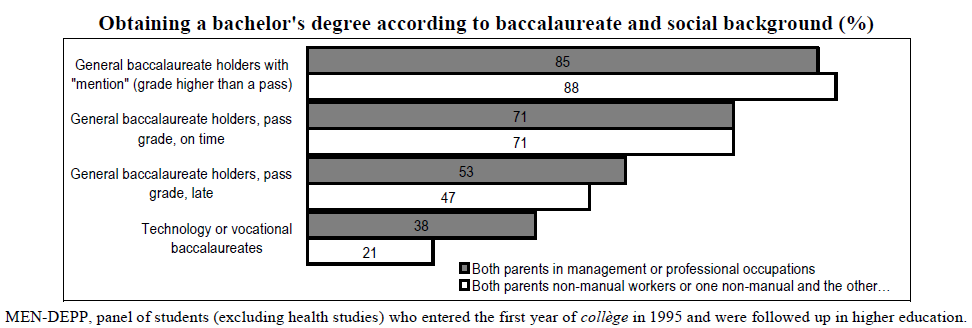Economie et Statistique / Economics and Statistics n° 499 - 2018 50% to the bachelor’s degree... but how? Young people from working class families at university in France
Article on one page
Key question
Since 2015, France has had the objective of taking 60% of a generation up to higher education degrees, with 50% at bachelor's level. In fact, 44% of pupils who entered collège (secondary school for ages 11 to 14) in 1995 graduated higher education – and 44.7% of people aged 25 to 34 in 2014 in metropolitan France. The new keystone of French education policy, access to the bachelor's degree is nevertheless still little studied in French sociology of education. The article investigates the impact of social and migratory backgrounds on achieving a bachelor's degree.
Methodology
The study is based on longitudinal data on the higher education of pupils who entered collège in 1995 (French Ministry of Education, DEPP and Insee). It looks at the trajectories of baccalaureate holders at three key moments in their educational careers: on entering university, in their first years at university, and once they had obtained their bachelor's degree. A series of logistics models and a data analysis are used to identify the pathways, taking into account social and migratory backgrounds.
Main results
On average, with a general baccalaureate obtained without repeating a year but without “mention” (the most frequent situation), 71% of the undergraduates (excluding health studies) whose two parents are in management or intermediate professions or two parents non-manual workers or one non-manual and one manual worker get a bachelor’s degree. The proportion is lower and the gap according to social origin more pronounced for “late” baccalaureate holders (who repeated a year), and even more so for holders of a technical or professional baccalaureate.
All things being equal and once the social and migratory backgrounds are controlled for, holding a technology or vocational baccalaureate cuts the chances of obtaining a bachelor's degree by a factor of five, compared with holding a general baccalaureate obtained on time without “mention”. More especially, students whose results in the assessments in the first year of collège placed them in the two bottom quarters are less likely to obtain the bachelor's degree.
61% of undergraduate students (excluding health studies) obtain a bachelor's degree. Girls obtain it more often than boys and under conditions that lead them more often to the highest higher education diplomas: almost half subsequently obtain a diploma at least equivalent to the Master's degree (bac + 5) against 37% of all graduates.
Among those who have obtained the bachelor’s degree, the “respectable” pathways of general baccalaureate holders are the most frequent, followed by the “middle-of-the-road” student pathways, which are neither excellent nor poor, then the “second-chance” technology and vocational education pathways.

Main message
In France, the bachelor's degree now appears to be a new academic threshold which gives a clear advantage to general baccalaureate holders. But the bachelor's degree also reveals differences between the general baccalaureate holders, particularly according to their collège and lycée career. Among students of working-class origin, it is girls who most often obtain a bachelor's degree. But the different ways of obtaining it also show the obstacles experienced by many, primarily inequalities in prior education, that consequences can be seen right up to the point of entering university. This study suggests that the objective of democratising higher education is inseparable from the fight against educational inequalities from primary school onwards.
Article on one page (pdf, 172 Ko )



